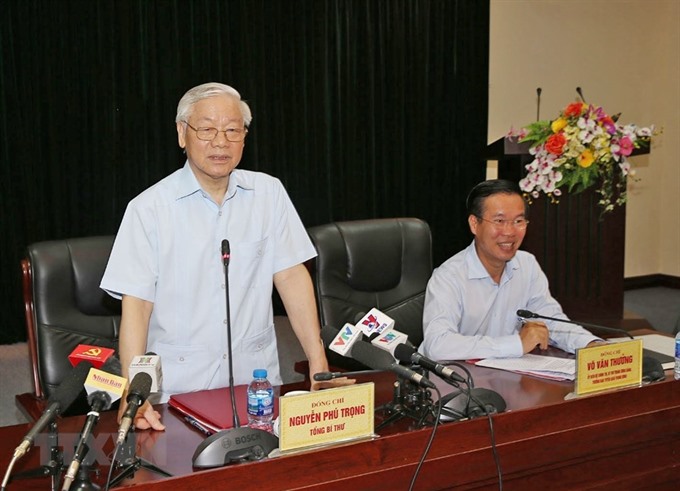|
|
| General Secretary of the Communist Party of Việt Nam’s Central Committee (CPVCC) Nguyễn Phú Trọng lauded the achievements made by the CPVCC’s Commission for Publicity and Education during a working session with key officials in Hà Nội yesterday. — VNA/VNS Photo Trí Dũng |
The session took place on the occasion of the 88th anniversary of Traditional Day of publicity-education sector.
The Party chief said as a think-tank of the CPVCC, the Politburo and Secretariat, the commission played an important role in Party building in terms of politics and ideology, spreading the Party’s viewpoints and guidelines, press and publishing, culture and education.
After the 12th National Party Congress and amidst rapid and complicated developments in the region and the world, the commission and publicity-education sector had closely followed the Party’s guidelines and the working agendas of the CPVCC, Politburo and Secretariat, making positive achievements and important contributions to the country’s success, he said.
Agreeing with the commission’s report detailing its seven achievements, seven shortcomings and nine key tasks for the near future, the leader said the first task for the commission and the sector was building the Party in terms of politics and ideology, including Marxism-Leninism and Hồ Chí Minh Thought, adding that theoretical research, education and dissemination were basic and important issues that decided the orientations of political thought.
Though the press had developed rapidly with rich and effective content, communication via word of mouth remained unreliable while management of online news was limited.
Moreover, the fight against wrongful and distorted allegations by hostile forces was yet to rally a collective power. He said the fight against corruption, wastefulness and negative behavior would stay on the path towards the goal of a wealthy people, strong country, and a democratic, fair and civilised society.
To that end, the Party must recruit outstanding, consistent and intellectual individuals who deserve to be leaders of the revolution and servants of the people.
He said information dissemination, building Party unity and public consensus was a great responsibility of ideological work.
The Party General Secretary lauded the commission for establishing steering boards to step up the fight against wrongful and reactionary opinions by hostile forces, especially amidst the fourth industrial revolution with different flows of thought and information on the internet, contributing to safeguarding revolutionary guidelines and the stance and nature of the Party.
The commission needed to train a contingent of officials to meet the demands of the current situation, who were qualified, consistent and absolutely loyal to the Party, he said.
Party committees and authorities at all levels were also urged to join the effort.
Speaking at the event, head of the commission Võ Văn Thưởng said the commission had asked the Politburo to issue Directive No.05-CT/TW on stepping up the campaign to study and follow the thoughts, morality and lifestyle of Hồ Chí Minh and documents guiding the implementation of the Directive during the tenure of the 12th National Party Congress.
The commission had also improved the quality of reports submitted to the Politburo and Secretariat, the efficiency of political ideology and focused on educating Party history across sectors and localities.
Positive progress had been seen in political orientations through the press and publishing activities, and culture and arts, bringing Party guidelines, policies and State laws to life.
Localities had paid attention to the preservation and development of traditional cultural values and festivals in tandem with tourism attraction and socio-economic development.
Over the years, Party and State guidelines and policies had also been disseminated abroad so that international friends and overseas Vietnamese communities could better understand about Việt Nam.
It directed ministries and agencies to monitor the implementation of resolutions and directives regarding education-training, science-technology, environment, healthcare, population and social welfare.
Publicity-education units from grassroots to central levels had oriented public opinion on issues of concern, and fought acts that took advantage of abusing democracy, human rights and religion to divide the nation and incite riots.

